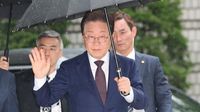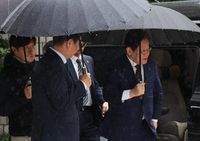On April 22, 2025, the Supreme Court of South Korea made a significant decision regarding Lee Jae-myung, the former leader of the Democratic Party, by referring his appeal concerning violations of the Public Official Election Act to the en banc. This decision marks a crucial step in a case that has garnered public attention and political implications.
The en banc, which is made up of 12 justices excluding the Chief Justice and the Minister of Court Administration, will deliberate on the case and render a final judgment. This process began immediately, with the first plenary session occurring on the same day the case was referred.
Initially, the Supreme Court had assigned Lee's case to Division 2, which includes Justices Oh Kyung-mi, Kwon Young-jun, Eom Sang-pil, and Park Young-jae, with Justice Park serving as the presiding justice. However, the court quickly determined that the case warranted the more comprehensive review that an en banc provides.
According to internal regulations governing the Supreme Court's procedures, the Chief Justice must listen to the opinions of the justices and designate cases for en banc deliberation, especially when there are conflicting opinions or when a change in the interpretation of existing precedents is necessary. Chief Justice Cho Hee-dae assessed that this case met those criteria, leading to its referral for en banc consideration.
Justice Noh Tae-ak, who also serves as the Chairman of the Central Election Management Committee, filed a recusal application in this case. His involvement raised concerns about potential conflicts of interest, particularly because he oversees election management and the case involves election law violations.
Lee Jae-myung's legal troubles stem from allegations that he publicized false information regarding preferential treatment related to the late Kim Moon-ki, who was the head of the Seongnam Urban Development Corporation's Development Division 1. The case also involves accusations related to zoning changes at the Korea Food Research Institute site in Baekhyeon-dong, Seongnam. Lee was initially sentenced to one year in prison with a two-year suspended sentence in November 2024. However, in March 2025, the appellate court acquitted him, stating that the evidence did not support the initial ruling.
Following the acquittal, the prosecution appealed, arguing that there had been a misinterpretation of the legal principles regarding the charge of publicizing false information under the Public Official Election Act. This appeal led to the case being escalated to the Supreme Court, where it will now be deliberated by the full bench.
This case is not an isolated incident for Lee Jae-myung. He previously faced scrutiny for a separate issue involving allegations of disseminating false information concerning the compulsory hospitalization of his brother, which was also referred to the Supreme Court en banc and resulted in an acquittal in July 2020.
As the legal proceedings unfold, the implications for Lee Jae-myung's political career could be significant. He was a prominent candidate in the 2021 presidential election and remains an influential figure within the Democratic Party. The outcome of this case may not only affect his personal future but also the political landscape in South Korea.
Public interest in the case is high, with many observers keenly watching the Supreme Court's deliberations. The en banc's decision will likely set a precedent for how similar cases are handled in the future, particularly those involving election law violations.
In a statement, Lee's legal team expressed confidence in their position, asserting that the appellate court's acquittal was correct and that they would vigorously defend against the prosecution's appeal. They believe that the evidence presented during the trial clearly demonstrated Lee's innocence regarding the charges brought against him.
The Supreme Court's en banc session is expected to attract significant media attention, and the final judgment will be closely scrutinized by both supporters and opponents of Lee Jae-myung. As the legal proceedings continue, the political ramifications of this case will undoubtedly resonate throughout South Korea's political arena.
As the en banc deliberates, the broader implications of the case extend beyond Lee Jae-myung himself. It raises questions about the integrity of the electoral process and the role of public officials in ensuring transparency and accountability. The legal battles faced by Lee could serve as a litmus test for how the South Korean judiciary handles politically charged cases.
In summary, the Supreme Court's decision to refer Lee Jae-myung's case to the en banc marks a pivotal moment in a high-profile legal saga that intersects with South Korea's political landscape. As the en banc prepares to deliberate, all eyes will be on the justices as they navigate the complexities of election law and the implications of their ruling.
![[속보] 대법, 이재명 ‘ 공직선거법 상고심’ 전원합의체 회부](https://thumbor.evrimagaci.org/8Imcl6hN6Ropppk324SCjagymCA=/200x0/tpg%2Fsources%2F9eb48cd0-7738-4070-97a6-f6bed56d4241.jpeg)

![[속보]대법원, 이재명 ‘선거법 위반’ 사건 전원합의체에서 판단한다](https://thumbor.evrimagaci.org/rZyd6dzsJ0XNcp4Xzx04u-_FPwA=/200x0/tpg%2Fsources%2F6e59c859-e171-4f7c-8f7e-3feae78fdddd.jpeg)




